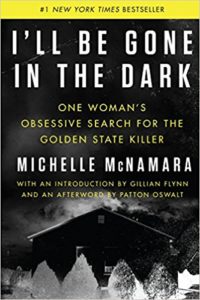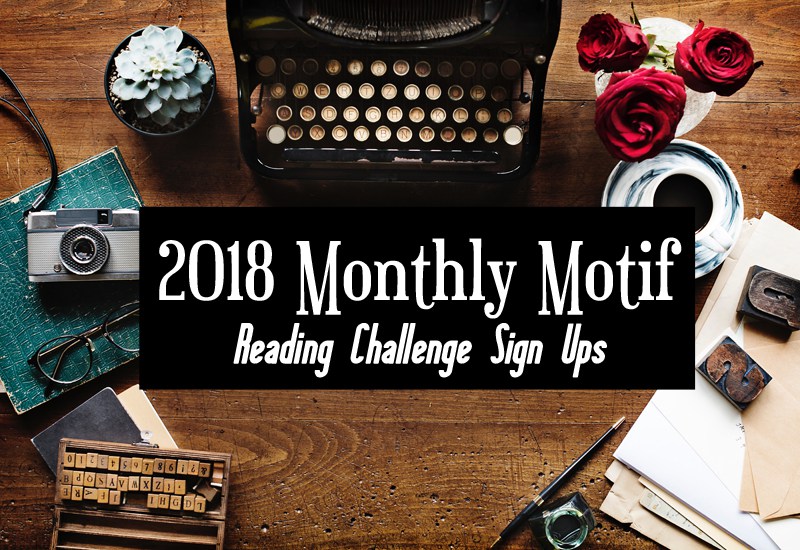 I'll Be Gone in the Dark: One Woman's Obsessive Search for the Golden State Killer by Michelle McNamara, Gillian Flynn, Patton Oswalt
I'll Be Gone in the Dark: One Woman's Obsessive Search for the Golden State Killer by Michelle McNamara, Gillian Flynn, Patton Oswalt Published by Harper on February 27, 2018
Genres: Nonfiction
Pages: 328
Format: Hardcover
Buy on Amazon
Goodreads

A masterful true crime account of the Golden State Killer—the elusive serial rapist turned murderer who terrorized California for over a decade—from Michelle McNamara, the gifted journalist who died tragically while investigating the case.
"You’ll be silent forever, and I’ll be gone in the dark."
For more than ten years, a mysterious and violent predator committed fifty sexual assaults in Northern California before moving south, where he perpetrated ten sadistic murders. Then he disappeared, eluding capture by multiple police forces and some of the best detectives in the area.
Three decades later, Michelle McNamara, a true crime journalist who created the popular website TrueCrimeDiary.com, was determined to find the violent psychopath she called "the Golden State Killer." McNamara pored over police reports, interviewed victims, and embedded herself in the online communities that were as obsessed with the case as she was.
At the time of the crimes, the Golden State Killer was between the ages of eighteen and thirty, Caucasian, and athletic—capable of vaulting tall fences. He always wore a mask. After choosing a victim—he favored suburban couples—he often entered their home when no one was there, studying family pictures, mastering the layout. He attacked while they slept, using a flashlight to awaken and blind them. Though they could not recognize him, his victims recalled his voice: a guttural whisper through clenched teeth, abrupt and threatening.
I’ll Be Gone in the Dark—the masterpiece McNamara was writing at the time of her sudden death—offers an atmospheric snapshot of a moment in American history and a chilling account of a criminal mastermind and the wreckage he left behind. It is also a portrait of a woman’s obsession and her unflagging pursuit of the truth. Framed by an introduction by Gillian Flynn and an afterword by her husband, Patton Oswalt, the book was completed by McNamara's lead researcher and a close colleague. Utterly original and compelling, it is destined to become a true crime classic—and may at last unmask the Golden State Killer.
I’ll Be Gone in the Dark is not the kind of book I would normally read, but I picked it up for several reasons: 1) my husband said it was good*; 2) this month’s Monthly Motif Challenge is “Crack the Case: Mysteries, True Crime, Who Dunnit’s,” so reading it offered and opportunity to keep my streak going with that challenge; 3) I was curious because the elusive Golden State Killer (as Michelle named him) has recently been found through DNA technology—40 years after he committed his first rapes; and 4) my husband and I went to Boston to see Michelle’s widower, Patton Oswalt, talk about this book and his wife’s work (this was before the killer had been apprehended), and his discussion of both the book and Michelle’s work intrigued me.
One of the things I appreciated the most about this book was Michelle’s own story—she explains where her fascination for crime came from and also describes her methodical detective work. Stephen King, who blurbs the book on the back cover put it this way: “What readers need to know—what makes this book so special—is that it deals with two obsessions, one light and one dark. The Golden State Killer is the dark half; Michelle McNamara’s is the light half. It’s a journey into two minds, one sick and disordered, the other intelligent and determined.”
I have a hard time with the concept of dwelling too much in the darkest recesses of the human psyche. I have occasionally watched and read true crime (hard not to when you are married to Steve Huff*), but by and large, I find it hard to inhabit that world. I vividly recall having a difficult time coping with it when my husband was researching a horrific child killer named Joseph Edward Duncan about a decade ago. I knew too many details about his crimes that I didn’t want to know, and as much as I admire my husband’s writing and his brain, I found it hard to continue to read his writing in this area. I don’t think he blames me for that.
One thing I think Michelle does really well is walk a fine line between giving necessary information while avoiding lurid details. Not to say you won’t be creeped out if you read this, and fair warning: true crime writers inevitably have to share some of the details. I am really glad I read it knowing that the Golden State Killer had been caught. My husband was out of town this weekend while I was reading the book, and I was having trouble sleeping a couple of nights in a row after we went to a U2 concert—I guess I was keyed up still—and the cat made a noise, and I nearly jumped out of my skin before remembering the guy was in jail and I live on the third floor anyway. He’s not likely to be creeping in my window. I could relate to Michelle’s story of nearly braining her husband with a lamp when he startled her awake one night. She said, and this line stood out to me, “There is a permanent scream lodged in my throat.” That sentence fascinates me because even after reading the book and understanding how she was really interested in getting to the bottom of mysteries, it is terrifying work. I can’t understand engaging in work that puts you in that position when you don’t have to be. My husband and I were talking about it, and he tried to explain it, and I guess it’s never something I will understand.
I was also fascinated to learn how much Michelle was able to coax law enforcement to share with her. I told my husband that if I were a cop, I am not too sure I’d want to work with any armchair detectives, but he says he thinks it depends on the cop, and also, many are grateful for any help they can get on cold cases and recognize that sometimes, people outside the situation connect dots that law enforcement doesn’t. For instance, my husband was one of the first people to find suspects’ social media accounts at a time when it seemed like law enforcement didn’t know how to do it.
Michelle accurately guessed that the Golden State Killer would eventually be found using DNA. With 12 (possibly 13) murders and over 50 rapes, the GSK left behind a lot of DNA, and he had some rare genetic markers in his profile. Michelle also posits in the book that he may have been in the Air Force (he had been in the Navy) and possibly even a police officer. He was (the frickin’ creep—in Auburn, CA, a suburb of Sacramento). He was actually fired as a police officer after shoplifting dog repellent and a hammer. Michelle was also correct that the GSK was also the criminal known as the Visalia Ransacker, who broke into homes in Visalia, CA and basically moved things around, stole things, and probably killed Claude Snelling, who caught the Ransacker attempting to rape his daughter. Michelle also guessed that he lived pretty close to where he was eventually found: Citrus Heights, CA. Most chillingly, Michelle accurately guessed the way it would go down.
You’ll hear footsteps coming up your front walk…
The doorbell rings.
No side gates are left open. You’re long past leaping over a fence. Take one of your hyper, gulping breaths. Clench your teeth. Inch timidly toward the insistent bell.
This is how it ends for you.
“You’ll be silent forever, and I’ll be gone in the dark, you threatened a victim once.
Open the door. Show us your face.
Walk into the light.
Reports say that the Golden State Killer was shocked when he was finally caught. I believe the timing of the book’s release and the GSK’s capture in the same year—within months—is no coincidence. Michelle’s writing about the case brought renewed attention to unmasking criminal behind the decades-old cold cases. For all I know, Michelle shared some of her ideas with law enforcement, who then acted upon them. She may be the real-life Sherlock Holmes, solving the mystery and allowing Lestrade and Scotland Yard to take the credit. Obviously, this is just conjecture on my part, and the folks in a position to say probably never will. That’s way it works.
Michelle died in her sleep on April 21, 2016. She hadn’t finished this book yet when she passed away, but her husband was determined that it be finished. It appeared in print a scant few months before the Golden State Killer, Joseph James DeAngelo, was finally unmasked. His DNA matched that of a distant cousin who uploaded DNA to GEDMatch, and a forensic genealogist pieced together his family tree. To be sure they had the right guy, police swabbed DeAngelo’s car door handle while he shopped in a Hobby Lobby store and swabbed a tissue from his trash to confirm the match. DNA doesn’t lie. It’s potentially problematic from a fourth amendment point of view that we can now conduct these kinds of investigations, but I can’t deny I feel good they caught this particular guy. It’s chilling to think he was probably within a decade or so of getting away with a rape and murder spree that’s truly horrifying. I am glad his surviving victims will have that closure and that he will have to pay in some measure for the crimes he has committed.
This book might interest other folks, like me, who are not invested in true crime, but folks who like reading about true crime will probably really like this book. Michelle is a good writer in an oeuvre in which good writing is regrettably rare. You can still read her blog, True Crime Diary. You can hear Michelle and Steve talking true crime here if you like. You can read a guest post he wrote for Michelle’s blog here, or this one about JonBenet Ramsey.
*Full disclosure: my husband writes often about true crime and knew this book’s author, Michelle McNamara. They never met in person, but I know they frequently corresponded and that they read each other’s work. That said, I never knew her or spoke with her. However, I couldn’t stop myself from using her first name throughout this review, something I avoid doing when I write about authors, because that’s who she is around this house—just Michelle.
